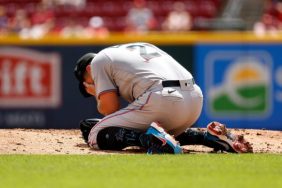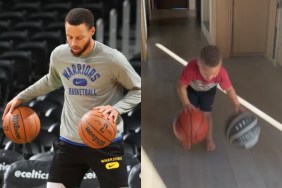My 75-year-old dad and I drove a 14-year-old gold Mercury Sable station wagon from Chicago to Los Angeles. In its teenage-length car lifetime, it racked up only 80,000 miles. Dad gifted it to me instead of the car dealership that offered him a mere $1,300.
Some time in its early years, the car acquired the nickname “The Pimp Mobile” for reasons still unknown to my family, other than that it is gold and my dad, the primary driver of this vehicle for many years, has a gold tooth. But he is no “pimp.” In fact, he might be the opposite of this — a gentle, quiet, overly sensitive and often times withdrawn man who was known as the class clown of his high school, dad has been living in the suburb of Skokie with my mom for the past 30-plus years. Dad retired about eight years ago from a government job, and since then his routine has consisted mostly of staying up until 3am watching either the news or National Geographic climate change specials in the dank, heavily air-conditioned basement, or transfixed to the screen of his laptop, tepidly trying his hand at online gambling.

Because dad goes to sleep super late, he usually wakes around 2pm in the afternoon, at which point he moseys on down to the kitchen and fixes himself some oatmeal with müesli or some sort of bowel-movement-inducing bran sprinkled over fresh fruit. He’s very passionate about organic farming, and even owns a share of a farm in downstate Illinois. Because of his late night hours, mom often times makes curt statements about their relationship, saying that they are “ships passing in the night.” But really, I think she means “tugboats bumping into each other mid-afternoon.” Despite dad’s strange hours, the two seem relatively happy. But mix up dad’s routine, bowel movements and all, and another side of him emerges.
This is what happened during our six-day cross-country road trip, followed by his five-day stay at my place in Los Angeles. We both got to see the other in their most raw, natural states-of-being. Our intensive time together led me to a next-level state of observation, which resulted in a performative narrative on Facebook. I chronicled official “dad moments,” the way we both made similar jokes in the vein of observational comedy, and our random moments of confessing pure love to each other.
I wasn’t sure what this new dad-inspired social media-mitigated narrative was about, however, until my friend Molly Shea – curator of Perform Chinatown 2015, co-host of our BrOccult podcast (if you want to know what BrOccult is, just picture two witches drinking sharing sips of a goblet filled with half-Gatorade and half-blood), and regular watcher of my social media feeds – let me know that she was enjoying my “dadwatch” posts. Then she turned it into #dadwatch, and I was off to the races.
Dadwatch means I am observing dad like a character, because there’s no other way to deal with the fact that our time in constant close proximity has become unbearable. We notice each other’s flaws, poking at the things that hurt, and then suddenly apologize or just try to ignore each other in semi-courteous ways.

In one #dadwatch performance that I didn’t post to Facebook, we are driving through Utah, somewhere neither of us have ever been before, when a storm suddenly hits. Dad tells me to turn the windshield wipers up. I do it. Then he says they’re going too fast and starts yelling, what’s wrong with you, don’t you know that they shouldn’t go that fast?! I want to explain to him that I need them to go that fast so that I can see the road — but there’s no chance to get a word in. Dad is focused on the road ahead. He decides that he knows how fast the windshield wipers should go even though he’s not driving.
I slow them down per his suggestion. Then he tells me that they should be going faster. I speed them up. Then the rain dies down, eventually petering out, and I am spacey and overwhelmed and I’ve left the windshield wipers swishing back and forth, pushing the water off the glass. I am tired because we have been driving for days, because there isn’t anything else for me to do but look at the neatly paved road ahead. I try to focus on that instead of the horsefly that’s stuck to the tiny corner of the windshield that the wipers can’t seem to reach. I’m spacing out again when dad notices the wipers’ speed.
“What’s wrong with you, Alicia? You’re having trouble driving?” he asks, a question that is not a question because he’s already determined the answer.

“I’m fine,” I say. “Just driving.”
“It isn’t even raining. The wipers, they’re like knives, they’ll cut the glass,” he says.
The windshield wipers are not sharp metallic objects, and this is just rain.
We’re in Utah, where the Mormons arrived after following Brigham Young. There was nowhere else for them to go. We were in bad dead lands where nothing grew and rocks accumulated, piles carved into amorphous shapes. In the arid air, few plants could grow or prosper.
“Let’s just pull over and we can switch drivers then,” I suggested calmly, not absorbing any of his frustration, which had nothing to do with the windshield wipers and everything to do with control.
“Yeah, that sounds like a good idea, Alicia. There’s something going on with you,” he responded, suspiciously, deterministically.
If there was something going on with me, I didn’t know what it was. I was driving across the country with my 75-year-old father and neither of us knew how fast to go.
Photos by Alicia Eler.
Crystal Paradise is a weekly column published every Tuesday by Los Angeles-based writer Alicia Eler that navigates the naturally occurring weirdnesses that spark at the intersection of art, technology and travel.
Read More Of Crystal Paradise!






